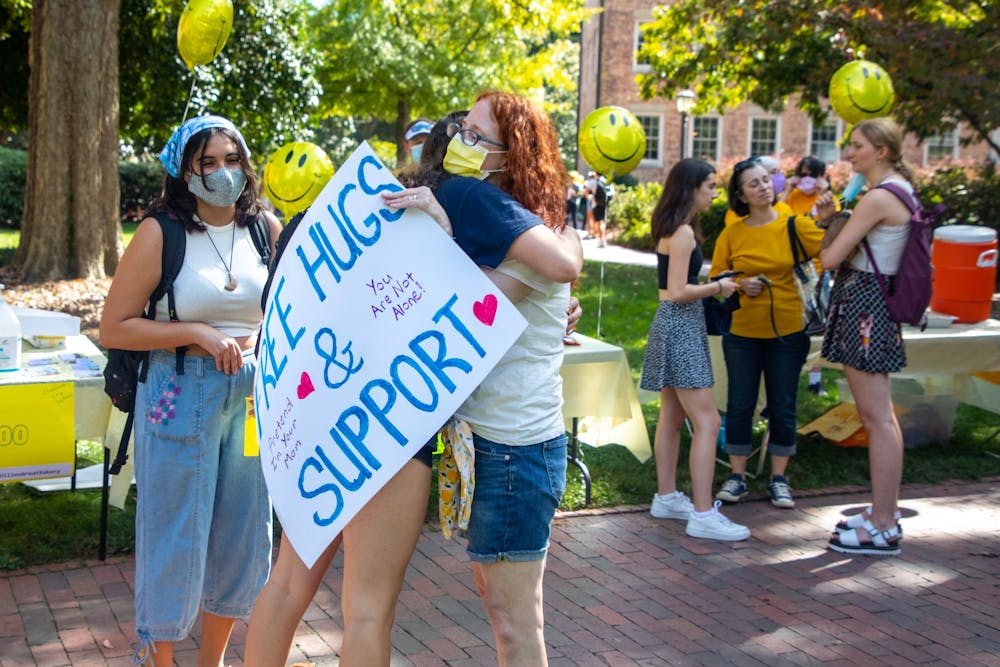Last fall, CAPS piloted the Multicultural Health Program, which focuses on the needs of students of color. Since then, it has been funded through an increase in student fees and now consists of six providers.
Still, this is not enough, and efforts to improving diversity must be made a priority.
Emails pointing students to resources — although kind-hearted and comforting in times of mourning — are largely hallow and symbolic. The glaring issue remains: UNC has no systemic practices for preserving and valuing student mental health.
In the past, policies that create more accommodating experiences for students, many of which emerged during the pandemic, have failed to endure as we transition to on-campus learning. They face critiques of being too lax on students as we work to pursue our degrees.
Let me be clear: There will never be such a thing as being too accommodating when it comes to mental health.
The idea that flexibility in grading and attendance policies will not adequately prepare students for the “real world” — suggesting that all students are equally insulated from the world outside of campus — just acknowledges how our systems of living and working are harmful and unsustainable. The changes that start on our campus must also influence how we handle work after graduation.
Mental health should be our priority, even when the institutions we belong to don’t recognize it as such. We have to put our well-being first.
Ideally, we are attending college to learn and to grow as people. Our University and its policies should reflect these goals. For far too long, my experience at the University has been dictated by GPA or attendance or some numerical evaluation of my performance.
Competition and academic success far too often drive us, as students, without regard to the toll they can have on our mental health. We are constantly stressing about courses and how to orient ourselves towards the future. We pile on internships and unpaid labor on top of our obligatory jobs and coursework.
Enough is enough.
True care needs to be embedded into our daily lives, systems and schedules. Every day — not just the days following tragedies. We need to put more value on self-care, leisure and departmental policies that allow students to succeed in healthy ways.
We need expanded pass/fail policies — because learning should be emphasized over letter grades and worries over how a course may impact our GPAs.
To get the day's news and headlines in your inbox each morning, sign up for our email newsletters.
We need thoughtful grading and exam schedules that allow for full communication and transparency between faculty and students — and introductory courses that don't attempt to “weed out” students who are struggling.
UNC should continue to foster relationships and communication channels that allow students to ask for help when they need it, via working, living and learning environments that we can lean on. There must be ways to take responsibility off our plates when it becomes too much, without retribution or scorn.
We also need to evaluate the ways in which our current institutions can actively be harmful to mental health.
When there is a lack of comprehensive health policy in a pandemic and the stress of illness falls on students as they live and work on campus, the University has proven to be a detriment to mental health.
When the administration fails to reckon with racial injustice on campus and consequently devalues the voices of students of color, it has proven to be a detriment to mental health.
When sexual assault is not properly addressed and survivors are left without adequate support, the University has proven to be a detriment to mental health.
UNC does not value mental health in any meaningful or systemic way.
Relying on the graces of individual professors to reschedule exams is not enough. Faculty serving as mental health providers is not sufficient. Having community support centers available for a singular week is not sufficient. As thoughtful and uplifting as these symbolic measures are — they are never enough.
As I write about the systemic mental health issues at UNC and how students bear the brunt of this burden, I can’t help but feel discouraged. Making mental health a priority is not and should not be treated like pushing a boulder up a mountain.
An emphasis on student wellness should not be conditional on students experiencing tragedies.
@caitlyn_yaede
opinion@dailytarheel.com
Caitlyn YaedeCaitlyn Yaede is the 2023-24 print managing editor of The Daily Tar Heel and oversees weekly print production. She previously served as the DTH's opinion editor and summer editor. Caitlyn is a public policy master's student at UNC.




